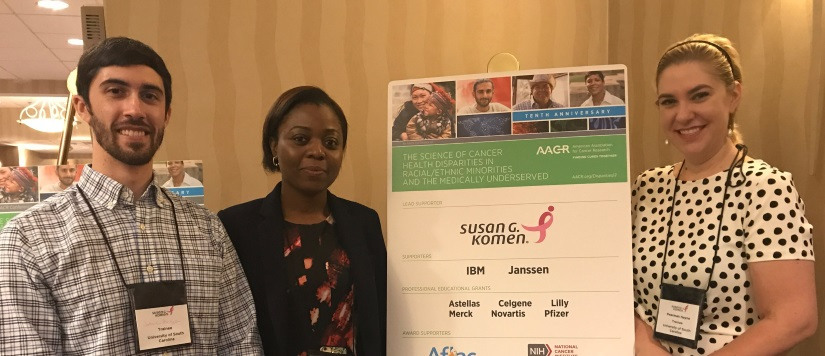September 28, 2017 | Erin Bluvas, bluvase@sc.edu
Associate professors Susan Steck (epidemiology and biostatistics) and Angela Murphy (School of Medicine) have been awarded a $405,000 grant from Susan G. Komen. The award is one of 98 new research grants to receive $30.7 million collectively from the breast cancer organization in 2017, and it is one of nine awards focusing on disparities in breast cancer outcomes (see press release for additional information).
The USC grant will be used to establish the Interdisciplinary Graduate Training to Eliminate Cancer Disparities (IGniTE-CD) program, supporting up to three doctoral students per year over the next three years. Training activities include lab/practice rotations, coursework, participation in seminars and journal clubs, abstract and manuscript submissions, and attendance at conferences and training events.
Breast cancer is the most commonly diagnosed cancer among women. It accounts for approximately one third of new cancer cases and is the second most common cause of cancer death among women. South Carolina has slightly higher incidence and mortality rates than the national average.
Significant disparities in this type of cancer can be found both in the United States and globally. African American women have about 40 percent higher risk of dying from breast cancer than white women. They are also more likely to be diagnosed at a younger age and with more advanced disease.
“Susan G. Komen has established a bold goal of reducing breast cancer deaths by 50 percent by the year 2026,” says Steck. “Addressing health disparities is an important way to have a major impact on death rates. Thus, the focus of Komen’s IGniTE-CD Program is to train the best and brightest young investigators to conduct research on breast cancer disparities. Our goal is to provide them with the knowledge and skills that they need in order to conduct meaningful research and become leaders in the field of breast cancer disparities.”
Three of the best and brightest young investigators, Pearman Parker Hayne (Ph.D. student, nursing; pictured right in photo above), Johnie Hodge (MD/Ph.D. student, medicine; pictured left in photo above), and Omonefe Omofuma (Ph.D. student, epidemiology; pictured center in photo above), have already joined IGniTE-CD as the program’s inaugural trainees.
Through her clinical rotations in oncology pharmacy at the University College Hospital Ibadan, scientific research in her epidemiology program at the Arnold School, and personal experiences with friends and relatives who have been diagnosed with cancer, Omofuma already has first-hand experience with cancer disparities. She applied to the IGniTE-CD program to gain expertise in breast cancer disparities in particular.
“The peril of cancer in the society and the huge gap in the diagnosis and survival of certain types of cancer between different groups of people has become apparent to me and this, among many other reasons, spurred my interest and decision to pursue a degree in epidemiology focusing on cancer research,” says Omofuma. “It is my aspiration to be involved in research in the breast cancer field that would aid in providing solutions to the most critical questions to better understand reasons for the disparities observed in incidence, treatment and survival outcomes.”
Each of the trainees brings a unique perspective to the program. Not only will they advance their expertise through their interdisciplinary training, but they can learn from one another as well.
“The awarding of this grant speaks to our collective strength in breast cancer disparities research across the campus of the University of South Carolina where we have world class investigators who are tackling this issue from a variety of angles,” says Steck. “As with any complex chronic disease, there are going to be multiple factors that affect breast cancer risk, mortality and disparities. Dr. Murphy and I believe that an interdisciplinary research environment is one of the best ways to encourage translational research that will have a major impact on eliminating these disparities.”
